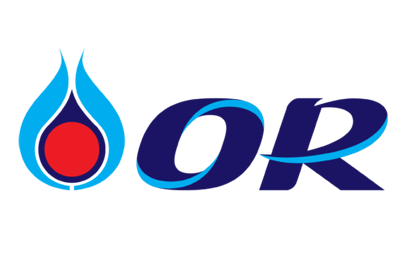
- หน้าหลัก
- >
- ความยั่งยืน
- >
- Waste, Oil and Chemical Spills Management
Waste, Oil and Chemical Spills Management
Importance
Waste management has been a significant global concern. According to the Global Waste Management Outlook 2024 by the United Nations Environment Program in collaboration with the International Solid Waste Association (ISWA), municipal solid waste is projected to increase to over 3.8 billion tons by 2050. This surge will result in enormous costs for waste management, including collection and disposal. Additionally, the continued rise in industrial waste generation in many countries, without proper management strategies from the industrial sector, could negatively impact public health and well-being.
Therefore, OR, whose business operations involve resource utilization and waste generation throughout its value chain, acknowledges the potential impacts of waste generated across its business—from upstream to downstream. As a result, waste management, including the prevention and control of oil and chemical spills, has become a priority for OR. The company aims to create a sustainable future through its OR SDG (Small, Diversified, Green) concept, within the Green framework, fostering opportunities for a cleaner society and promoting green business initiatives to ensure a sustainable environmental future.
2024 Targets

Management Approach
Waste Management
OR set the quantified targets to minimize waste for all operations which is a zero hazardous and non-hazardous waste disposal sent to secure landfill in order to reduce the waste sent to landfill. In 2024, to enhance waste management effectiveness, OR has conducted waste assessments /audit, according to ISO 14001 to identify opportunities for improving waste performance. Moreover, the SSHE Performance Database has been used to identify the amount and type of waste being generated in a company’s operations and monitor a waste’s trend.
OR establishes an Integrated Terminal Operation System (I-TOS) which integrates the management systems for operation such as ISO, TPM, KM, PIC, and SSHE into the same system to reduce the repeat works. I-TOS system contains the process of assessing the organization’s context, defining the internal-external issues, identifying opportunities, losses, and risks, and performing countermeasures according to such management systems. The scope of the key issues covers security, safety, occupational health, and the environment. These processes can help to prevent, monitor, and minimize the environmental impacts and also minimize waste from operation according to ISO14001.
OR is accelerating waste reduction throughout its value chain by promoting action plans to reduce waste generated in production processes. This includes the implementation of the Sustainable Coffee Project, which offers tailored training courses designed to meet farmers’ needs, covering coffee cultivation, maintenance, harvesting, and processing. These efforts help improve the quality of raw materials entering OR’s operations, contributing to waste reduction. In addition, OR is currently exploring the feasibility of repurposing waste from coffee processing into value-added products to further enhance business opportunities.
Furthermore, OR also invests in innovation and R&D to minimize waste, such as research on utilizing coffee husks and shells as alternative materials for mushroom cultivation. This initiative exemplifies the beneficial reuse of waste generated from production processes. In addition, OR is currently exploring the potential utilization of coffee husks and shells — by-products generated from the coffee milling process at its coffee bean processing facility in Chiang Mai province. The study encompasses the analysis of the chemical and physical properties of the coffee husks, their potential application as soil amendment materials for agricultural use, and the feasibility of converting them into biochar. This initiative reflects OR’s commitment to promoting circular economy principles through the valorization of agricultural waste.
For the recycling program, OR has conducted Scrap LPG Cylinder Recycling Project as a part of broader effort to integrate recycling programs to reduce the waste sent to landfill. The components of LPG cylinders that fail to meet inspection standards, including handles and bases, are recycled into steel shot for use in the shot blasting process during the LPG cylinder refurbishing process.
The majority of raw materials utilized in OR’s businesses are oil, LPG, base oil, coffee beans, mixing powder, and baking flour, which are processed into products for customers and consumers through the OR business’ value chain. This results in the following primary types of waste; oil sludge, oil-contaminated materials, coffee chaffs, and plastic cups, breadcrumbs, and defect mixing powder, all of which, without proper management, could lead to environmental impacts.
OR’s activities result in the generation of various types of waste. Therefore, OR has established management guidelines for each waste type, integrating these guidelines into each of OR’s business as shown in the table below.
Business Types |
Significant Types of Waste |
Potential Impacts |
Waste Management Guideline |
|---|---|---|---|
|
Petroleum/Oil Terminal |
Oil Sludge cake and |
- Environmental pollution |
Disposal is carried out by waste disposal service providers with a license as legally required, alongside action plans to reduce waste generation. |
|
Lubricant Distribution |
1) Film wrap |
- Environmental pollution |
Waste is recycled by waste disposal service providers with a license as legally required, as part of a broader effort to integrate recycling programs to reduce the waste sent to landfills. |
|
FIT Auto Service Stations |
1) Contaminated packaging |
- Environmental pollution |
Waste is recycled by waste disposal service providers with a license as legally required, including waste reduction training provided to employees. |
|
PTT Station / Café Amazon |
1) General waste |
- A breeding ground for insects and carriers of the disease |
Waste is sent to segregation and recycling. |
|
Café Amazon Coffee Roasting Plant |
1) Food Waste |
- A breeding ground for insects and carriers of the disease |
1) Food waste is used as a raw material in the production of soil amendment materials. |
|
Bakery Plant and Dry Mix Plant |
1) Food Waste |
- A breeding ground for insects and carriers of the disease |
1) Food waste is used as a raw material in the production of soil amendment materials. |
|
Lifestyle Distribution Center |
1) Food Waste |
- A breeding ground for insects and carriers of the disease |
1) Food waste is used as a raw material in the production of soil amendment materials. |
|
LPG Cylinder refurblishing plant |
1) LPG cylinders that does not pass the inspection test according to the standards. |
- Causes pollution to the environment |
1) LPG cylinders that does not pass the inspection test according to the standards are sent for recycling through licensed service providers, as legally required, with waste recycling integrated into the disposal process. |
For non-recyclable waste, OR has measures to ensure that waste are properly disposed of by a licensed disposer as legally required. The licensing companies who collect waste from OR’s operation will clearly identify the reuse or recycling methods to ensure zero waste to landfill. The amount of waste diversion to landfill and the disposal methods will be then reported and verified by an independent accredited body. The assurance statement is presented in the link: Assurance Statement of Sustainability Management. In 2024, OR achieves the zero waste-to-secure-landfill target for both hazardous and non-hazardous waste.
Apart from the programs to reduce and eliminate waste from operations, OR also provides Lean Six Sigma waste reduction training to employees. The objective of the training program is to apply Lean Six Sigma principles to reduce costs/expenses, leading to higher production efficiency and waste reduction in OR’s operations.
Oil and Chemical Spills
As one of OR’s businesses is in the oil industry, oil and chemical spills may occur, which could severely affect the environment and nearby communities, as well as adversely impact OR’s business. Therefore, OR places great emphasis on preparing to respond to oil and chemical spills. Oil spill response equipment has been installed to handle such incidents, and regular inspections are conducted to ensure its readiness in all areas. Annual emergency response drills are held for oil depots, petroleum terminals, and aviation depots, enabling OR to respond promptly when spill incidents occur. Furthermore, OR collaborates with the members of the Oil Industry Environmental Safety Group Association (IESG) to raise funds for the purchase of equipment that can respond to increasingly severe spill incidents.
In addition, OR has adopted the environmental restoration guidelines for spill incidents from the PTT Group to carry out environmental rehabilitation when such incidents occur. In 2024, there were no significant spill incidents at OR’s facilities.
Performance
Waste management
To achieve the goal of zero waste to landfill, OR has initiated the following project in 2024:
1. Waste management of the PTT LPG cylinder business
The PTT LPG Cylinder Refurbishing Plant operation process begins with the inspection of the cylinder’s condition and its classification into different repair categories. The repair process includes Hot Work, Hydrostatic Testing, and Expansion Testing based on the cylinder’s age, as well as repainting. After that, the valve is assembled, the label and weight markings are applied to the side of the cylinder, and a Leak Test is conducted. Once the test is successfully completed, the cylinder is transported to the filling plant for gas filling. All of these steps are carried out to ensure the cylinders meet safety standards, providing consumers with confidence in their use.
However, the process of testing and maintaining LPG cylinders generates a significant amount of waste from various processes. Therefore, to achieve its waste management targets, OR has implemented the following Initiative projects:
- Scrap LPG Cylinder Recycling Project involves the recycling of damaged LPG cylinders that does not pass the inspection test according to the standards, as well as valve bonnet and old cylinder bases resulting from the replacement process during the Hot Work process. These materials are transformed into steel shot, which are then reused in the LPG cylinder refurbishing process.
- The Used Lube to Alternative Fuel Oil Project involves expanding the storage of used lubricants to 3 PTT LPG Cylinder Refurbishing Plants, located in Ayutthaya, Khon Kaen, and Songkhla. The used lubricant, which has been used in various machinery processes, is collected and stored for recycling into alternative fuel oil, which is then used as an alternative fuel source for industrial customers.
- The study on the transformation of brass valve components, which are currently auctioned for recycling in various industries, has revealed challenges in separating unnecessary components, such as springs and rubber parts, from the brass. This often leads to contamination, resulting in brass with lower purity. Therefore, OR has initiated a study to separate brass valve components, removing unnecessary internal parts before the recycling process. This approach aims to add value to the brass in the recycling industry.
2. OR continuously implements the Zero Waste project at PTT Stations to efficiently manage waste at the source. This initiative involves operating and learning waste management centers, utilizing waste generated at PTT Stations to, for example, produce fertilizers from composting food waste and create bio-liquid fertilizer. These projects are currently being carried out at 9 PTT Stations as follows:
- Saraphi Branch
- Laem Chabang Branch (Inbound)
- Laem Chabang Branch (Outbound)
- Western Outer Ring Road Branch
- Saraburi Branch
- Rama 2 Branch (Outbound)
- Bangna Branch (Outbound)
- Vibhavadi 62 Branch
- Wang Chan Branch
Oil and Chemical Spills
- OR has opened the ‘OR Oil Spill Response Training Center’ to enhance safety standards and environmental protection within the oil and gas industry.
OR officially opened the “OR Oil Spill Response Training Center” at the Saraburi Oil Depot, Sao Hai District, Saraburi Province, marking an important step in raising safety standards and environmental protection in Thailand’s oil and gas industry.
This “OR Oil Spill Response Training Center” operated by the OR Academy, is equipped with comprehensive, state-of-the-art equipment and facilities. These include a large water basin covering 1,500 square meters for practical training, various types of oil booms with a total length exceeding 100 meters, oil skimmers powered by hydraulic engines, sea spray oil dispersant equipment, a 1,200-liter floating storage tank, an 11,000-liter fast tank for liquid storage, and an oil spill response boat. This demonstrates OR’s commitment to environmental protection and operational safety, particularly in addressing oil spill incidents. With OR’s oil depot located near several water sources, the company recognizes the importance of preparedness in effectively responding to emergencies.
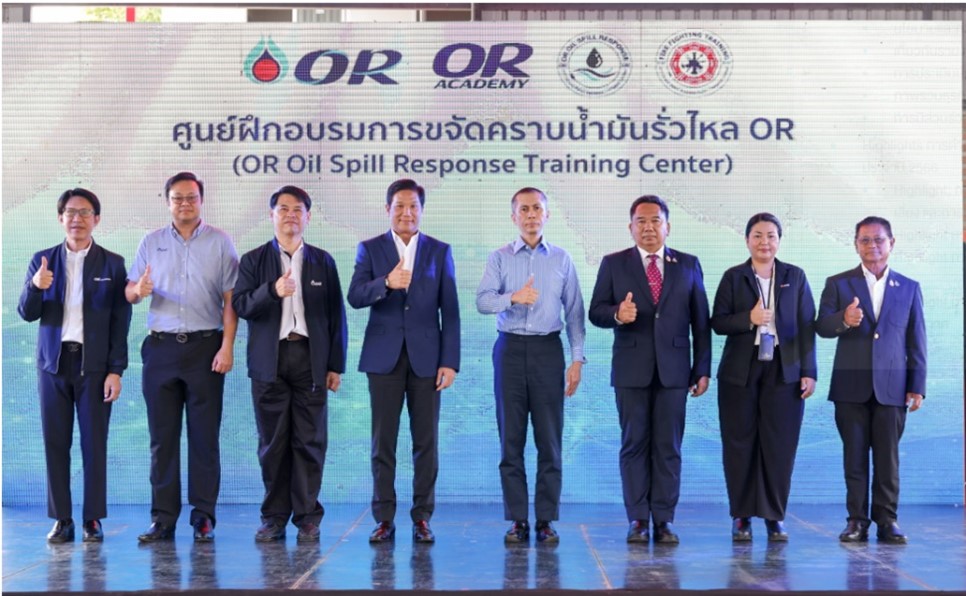
Partnership for the ‘Thai People Without E-waste’ project and the ‘Dispose of E-waste, Equals Planting’ project.
OR joined as a partner in the “Thai People Without E-waste” project for the first time in 2023. This project is a collaboration between Advanced Info Service Plc. (AIS) and over 210 partner organizations, with a mission to promote environmental awareness, foster participation, and reduce global warming in pursuit of sustainable environmental development goals.
OR encouraged employees to contribute to a cleaner society by bringing electronic waste to collection points at OR’s Phra Khanong office and the headquarters at the Enco B building. The goal was to properly manage this waste and reduce pollution and greenhouse gas emissions. In 2024, OR successfully collected 222 electronic waste items from employees, contributing to a reduction of greenhouse gases by 12.38 kg of CO2 equivalent.
Furthermore, OR participated in the “Dispose of E-waste, Equals Planting” project, a collaboration between AIS, partner networks, and the Bangkok Metropolitan Administration (BMA). In this initiative, every piece of electronic waste disposed of at collection points earned a tree from the BMA, which could then be planted to create green spaces and absorb greenhouse gases. In 2024, OR distributed the trees received from the project to employees who participated and planted them in the OASYS business area, helping absorb an average of 1,998 kg of CO2 equivalent annually.
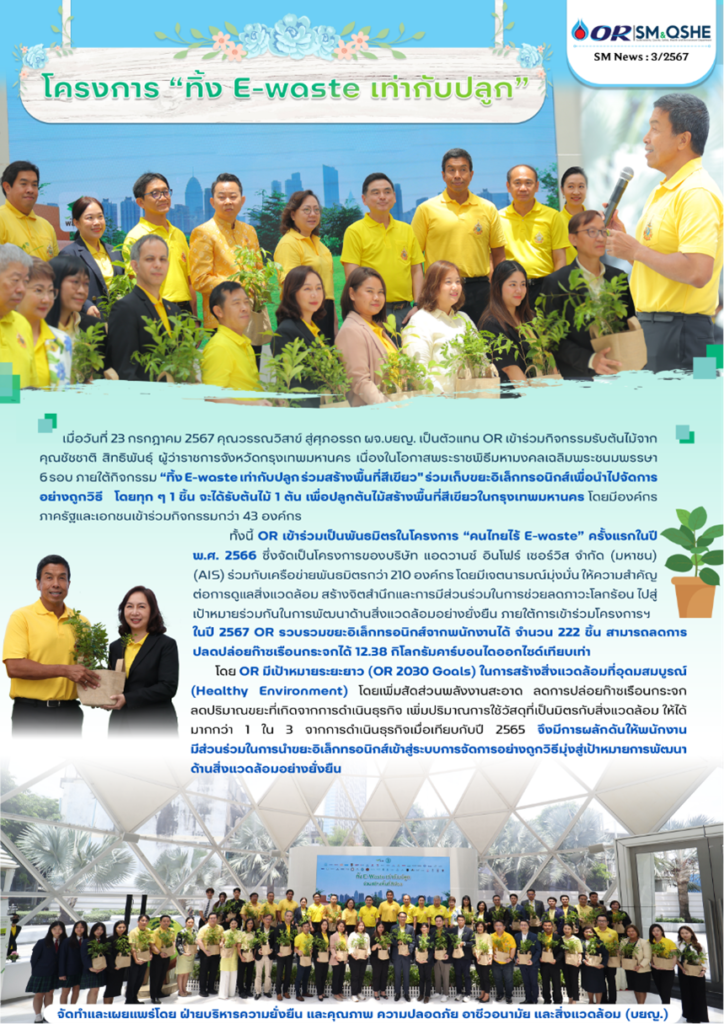
“Bok Rak Chao Phraya: Say Goodbye to River Waste” Project
OR and GC collaborate with the Bang Nam Phueng community and relevant agencies to launch a sustainable waste management model for the Chao Phraya River at Wat Bang Nam Phueng Nok, Samut Prakan Province. This initiative was launched as a part a memorandum of understanding on marine waste management, which involves the active participation of all sectors in the estuary. The project was initiated by the Ministry of Natural Resources and Environment, through the collaboration of GC, OR, authorities, and volunteers who work together to collect waste and separate plastic waste from other garbage, especially plastics, to prevent them from flowing into the sea and affecting the environment. Plastic waste is then directed into recycling and upcycling processes under the “GC YOU-turn Platform” to create value-added upcycled products. The project also promotes knowledge about proper waste separation and management, serving as a role model for expansion to other areas. The partnership between the government, private sector, and the community plays a crucial role in waste separation and in bringing recyclable materials, like used plastic, into the proper waste management system. The goal is to address waste problems in the Chao Phraya River and reduce the amount of waste flowing into the sea sustainably.
Furthermore, OR and GC organized a workshop on waste separation as part of the “Bok Rak Chao Phraya: Bok La Kaya Maenam (Say Love to Chao Phraya: Say Goodbye to River Waste)” initiative, held at the Bang Kachao Learning Center in Samut Prakan Province. The main activities included a workshop on waste separation and raising awareness about waste management for the local community and waste separation staff from the Bang Yao Subdistrict Administrative Organization. The training aimed to equip participants with the knowledge needed to address waste problems sustainably.
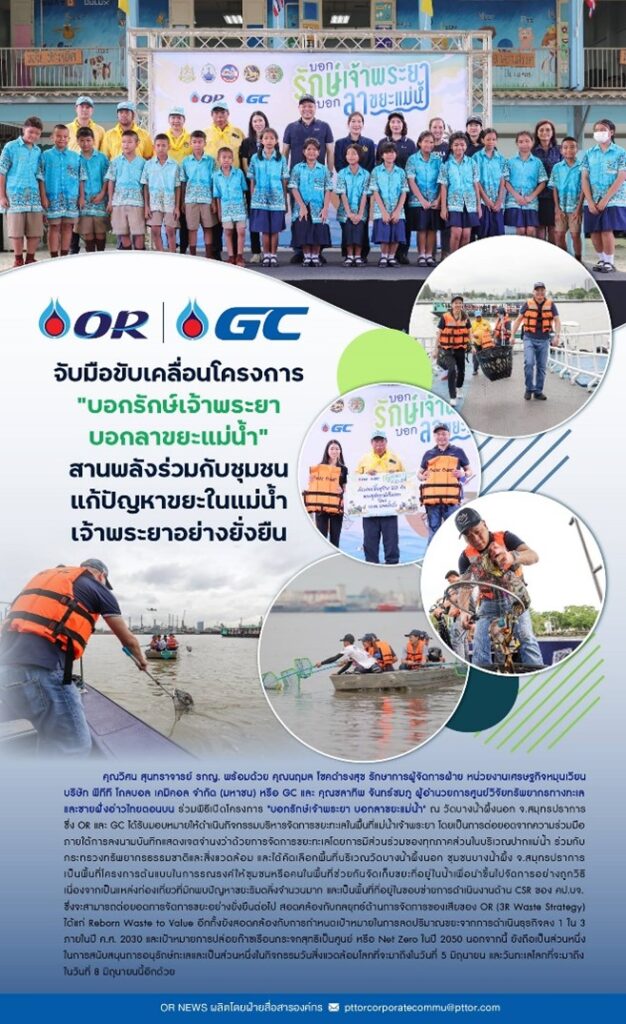
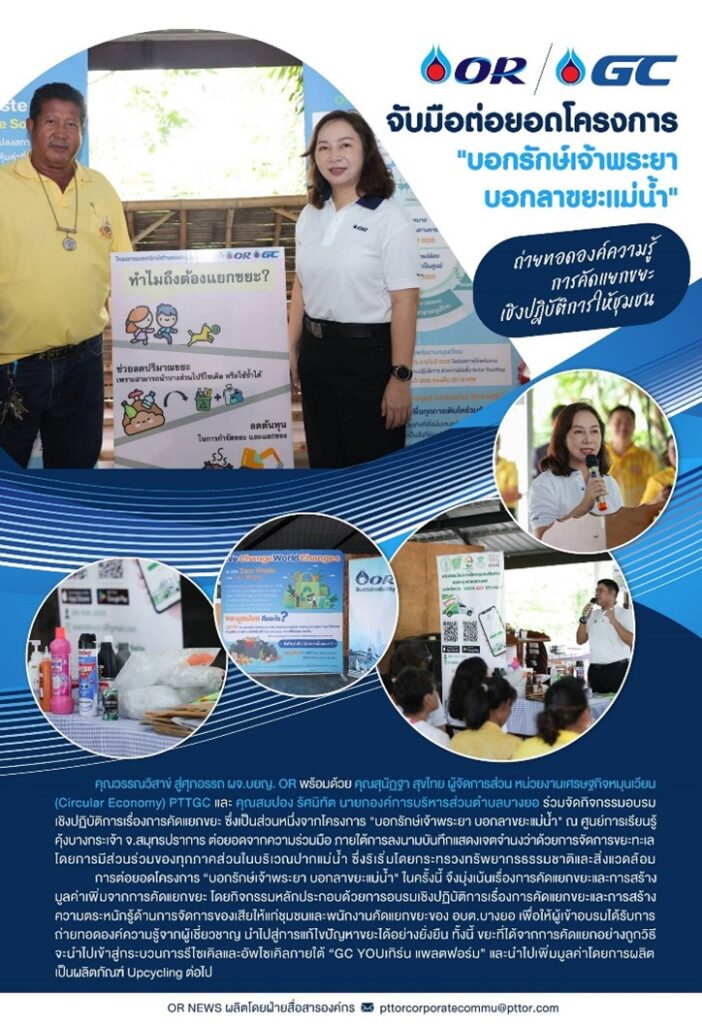
Site map
- About
- Organization
- Career
- Oil Business
- - Retail Energy Solution
- - Commercial Business
- Retail Business
- Services
- International Business
- Business Opportunity
- Sustainability
PTT Oil and Retail Business Public Company Limited
555/2 Energy Complex Building B, 12th Floor, Vibhavadi Rangsit Rd., Chatuchak, Bangkok 10900
© 2024 OR Tel : 02 196 5959
